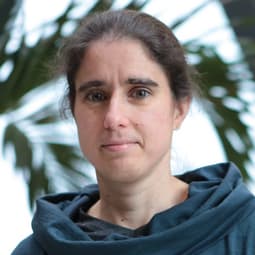
Emma Schymanski
Full Professor, Environmental Cheminformatics, Luxembourg Centre for Systems Biomedicine, University of Luxembourg, Luxembourg
False

Full Professor, Environmental Cheminformatics, Luxembourg Centre for Systems Biomedicine, University of Luxembourg, Luxembourg
Main research aims? The identification of known and unknown chemicals in our environment and their effect on health and disease, primarily with open source cheminformatics approaches coupled with high resolution mass spectrometry.
Most critical environmental issue… Interestingly, I was asked ~5 years ago to ponder the future of non-target screening (NTS) in 100 or even 25 years’ time and I remember thinking at the time “I hope by then the main challenges of NTS are solved and we can move onto other topics” (which would have been a very short review article so I wrote about something else instead). Reflecting on this now, perhaps I was a little optimistic. Today I feel we have made a lot of progress but we still have a number of issues to overcome before NTS moves into truly routine applications, but I certainly hope that this is now achievable within the next decade. Moving NTS into routine applications will enable (more broad) real-time monitoring of the environment and thus the establishment of early warning systems to better prevent or mitigate environmental catastrophes, or large-scale chemical contamination of human (or other) populations as seen in Dark Water and other films, through to earlier recognition and prevention of regrettable substitutions. I believe we have many of the “puzzle pieces” already available and the general awareness, willingness and know-how – a concerted community effort at harmonizing and transforming NTS into a routine effort could really revolutionize environmental but also personal health monitoring. I believe analytical science can help us achieve this in the next 10 years if we focus our efforts well. It will be interesting to revisit this in 10 years and see if we managed!
Most memorable piece of advice? Actually for me it’s two pieces of advice that combine to be both memorable and recurrent; I use them repeatedly either in combination or separately – “gather the data” and “pick your battles.” Certainly picking the wrong battle at the wrong time can be extremely energy-draining, as is even the right battle at the wrong time, but I work in an extremely challenging (and as many say at times overwhelmingly depressing) field, and picking the right battle at the right time can be extremely rewarding, leading to great science and novel insights that have unforeseen (at the time) rewards and consequences. Some examples from my research could be the 2014 Confidence Levels, the CASMI Contests (2012-2017) and more recently PubChemLite to help “tame” chemical space and make non-target screening more interpretable. “Gather the data” is so true for both research and life: if things don’t seem quite right, or if what’s happening doesn’t match up, gather the data until there’s enough evidence or clarity to make sense of all the inputs in front of you. If you gather enough of the right data, it’s easier to find the right timing for the right breakthrough or action.
Receive the latest pathologist news, personalities, education, and career development – weekly to your inbox.

False
False
False